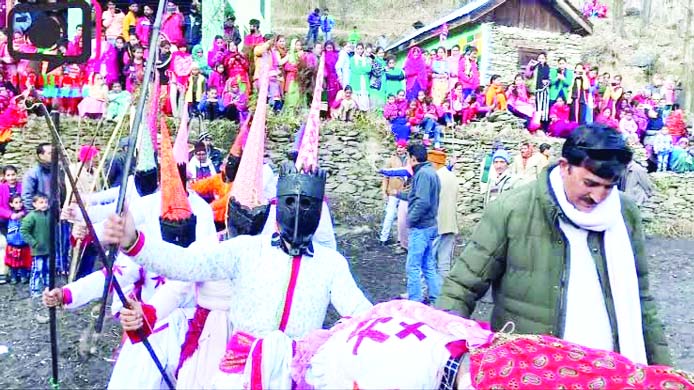Sadaket Ali Malik
The traditions of Bhalessa are adorned with unique celebrations like “Kod”, “Panyaou”, “Kanchoth”, “Basow”, “Dikhneen”, “Malchay”, and “Rang”, each of which showcases a specific aspect of local customs, beliefs, and lifestyles. Among these, the Rang Mela stands out for its winter significance, becoming a focal point of cultural and social exchange. The festival provides a space where generations unite, reconnecting with their roots while celebrating the joys of winter.
Bhalessa, a culturally rich area in the Chenab Valley, transforms into a vibrant hub of festivities every winter with the annual celebration of Rang Mela. Held in the snow-laden landscapes of Chilli and Dhossa, this traditional fair becomes a beacon of unity, cultural pride, and celebration of heritage. Rooted deeply in the traditions of the region, Rang Mela is more than just a festival-it is a living testimony to the beauty, resilience, and shared values of the people of Bhalessa.
Bhalessa’s identity is shaped by its cultural diversity and an inherent sense of community and brotherhood. The region exhibits a beautiful fusion of languages, where Kashmiri, Gojri, and Pahari dialects intermingle, reflecting the multicultural essence of its people.
Adding to this vibrant cultural tableau are the Gujjars and Bakarwals, semi-nomadic communities known for their seasonal migrations. Their presence brings a unique dimension to the Rang Mela, as they contribute traditional crafts, folklore, and trades, creating an enriching confluence of pastoral and settled ways of life.
As the first snowfall graces the serene landscapes of Chilli and Dhossa, Bhalessa transforms into a breathtaking winter wonderland. Snow-clad peaks and valleys set the perfect stage for the Rang Mela, attracting locals and visitors alike to partake in the revelry. The festival is a symbolic gathering where the beauty of nature meets cultural celebration, turning the region into a spectacle of joy, unity, and artistic expression.
The center piece of this Mela is its folk dances, performed by groups adorned in colorful traditional attire. These dances serve as expressions of cultural identity, storytelling, and artistic flair. Accompanied by traditional instruments and rhythmic beats, the performances pay homage to centuries-old customs while also celebrating the magic of winter.
Beyond the visual delight of dances and snowfall, the Rang Mela becomes a cultural extravaganza showcasing the artistic and culinary heritage of Bhalessa. Talented artisans and craftsmen display their skill through intricate works, ranging from textiles and woodcraft to pottery and decorative art. These exhibits not only highlight local creativity but also provide a platform for preserving endangered traditional skills that have been passed down through generations.
The festival is also a paradise for food lovers. The aroma of traditional dishes such as Maddur, Khatta Meat, and other local delicacies wafts through the air, inviting visitors to indulge in the rich culinary traditions of the region. Local families prepare these dishes with love and pride, offering a sensory journey that reflects the warmth and hospitality of Bhalessa.
Rang Mela is not merely a festival but an emblem of unity and social cohesion. It brings together people from diverse backgrounds-farmers, traders, artists, elders, and youth-celebrating their common identity while respecting their unique contributions. This communal gathering strengthens bonds, revives traditions, and provides a sense of belonging among the residents of Bhalessa.
Amid the challenges of modern life, Rang Mela serves as a reminder of the importance of preserving cultural heritage. It creates an environment where elders pass on wisdom and stories to younger generations, ensuring the continuity of traditions and shared values
Despite its cultural richness and visual appeal, Rang Mela remains largely undiscovered by mainstream tourism. With the right promotion, infrastructure, and support, the festival has the potential to become a major cultural tourism phenomenon. Drawing visitors from across the country and beyond, it could not only boost the local economy but also shed light on the unique traditions of Bhalessa.
The development of tourism facilities, such as homestays, local guides, and curated cultural experiences, could provide visitors with a deeper understanding of the region’s heritage. By promoting Rang Mela as a winter cultural event, it would also offer an alternative tourism destination, attracting those who seek authentic cultural experiences amidst natural beauty.
This mela symbolizes the resilience and beauty of intangible cultural heritage, which deserves recognition, preservation, and promotion. Steps are needed to document the traditions associated with the festival, including its dances, folklore, crafts, and cuisine. By integrating Rang Mela into broader cultural programs, it can continue to thrive for generations to come.


